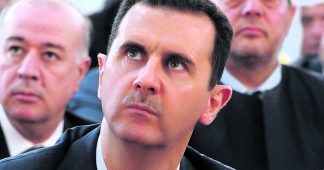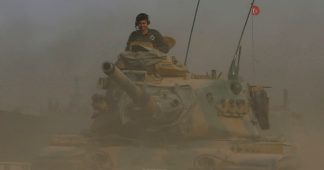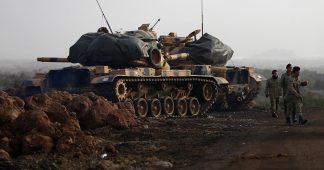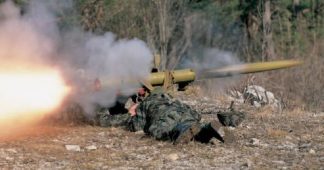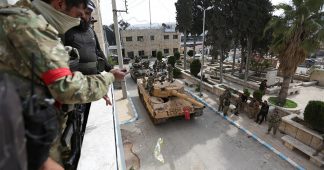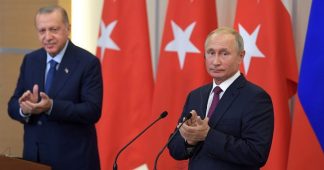15.09.2018
In order to understand Turkey’s approach toward the conflict in Syria, one first needs to explain the military situation there as of September 2018.
There are localized clashes between militant groups led by Hayat Tahrir al-Sham (formerly Jabhat al-Nusra, the Syrian branch of al-Qaeda) and the Syrian Arab Army (SAA) in northern Latakia and southern Idlib. The Syrian Arab Air Force and the Russian Aerospace Forces are carrying out strikes on weapon depots, equipment and UAV workshops and key facilities belonging to militants in southern and southwestern Idlib.
These as well as deployment of additional SAA units at the contact line between the militant-held and government-held areas are described by pro-militant sources as clear sings of the upcoming SAA operation to defeat Hayat Tahrir al-Sham and other al-Qaeda-like factions there.
In Suweida and Rif Dimashq, the SAA is still working to eliminate ISIS cells operating in the desert area. Separate ISIS attacks on the SAA and the US-backed Syrian Democratic Forces (SDF) happen time to time.
In those parts of Raqqa and Deir Ezzor provinces, which are controlled by the Kurdish-dominated SDF, the health care system has been totally destroyed, and no effort is being made to restore major infrastructure. Many of the areas under SDF control suffer from epidemics due to the shortage of clean water, and nearly total absence of medical services. The situation particularly bad, when it comes to restoring normal life and services. Local authorities, who should be involved in these matters, are mainly concerned with their own well-being. Kurdish leaders still view their main task as the creation of an independent enclave and later their own state in these territories. This is why their main concern is to keep the political and military dominance in the Arab-populated area.
Negotiations between Damascus and the Kurds are continuing at a slow pace. The Kurdish political leadership are seeking to get concessions from Damascus, for example some kind of federation within Syria.
Afrin, controlled by the Turkish Armed Forces (TAF) and Ankara proxies, is experiencing low-intensity guerilla war. Cells of the Kurdish People’s Protection Units (YPG) regularly carry out bombings and hit-and-run attacks on Turkey-led forces.
The TAF has introduced additional security measures, increased the number of UAVs deployed and imposed practice of burning plots close to cities to react to YPG raids more quickly. However, the YPG continues a limited partisan war in Afrin, but without having sufficient forces to return it to own control.
At the regional level, Ankara wants to position itself as the most important player in the matter of resolving the Syrian crisis. Turkey is actively supporting only those formations in Syria, which are loyal to and affiliated with it. The purpose is to turn Syria into a country loyal to Turkey, to neutralize Kurdish armed formations, to replace the Assad government, and to create a reliable pathway for energy supplies, especially oil, to Turkey. To achieve these goals, Ankara is using the rhetoric of counter-terrorism, though in reality it will support any organization ready to help to achieve its goals.
On the local level, Turkey’s goals and tasks consist of two parts:
The first is to deal with Kurdish armed formations in northern Syria. Turkey is directly fighting Kurdish armed groups in northern Syria, mainly the YPG. The YPG is the core of the US-backed SDF. At the same time, the YPG is linked to the Kurdistan Workers’ Party (PKK) both military and politically. [the YPG’s political wing, the PYD, is part of the Kurdistan Communities Union (also known KCK) together with PKK] Turkey alongside with the US and many other states consider the PKK as a terrorist group. Despite this, the YPG and the PYD as a dominating part of the SDF receive support from the US.
The announcement that SDF bases would be used to prepare so-called “border security forces” (BSF), which would protect SDF/YPG-occupied parts of Syria, provoked a sharply negative reaction in Ankara, which accused the US of creating a “terrorist army” on the border with Turkey. If the BSF is successfully established, it would become an important step of the PYD/YPG, backed by the US, en route to establish a Kurdish semi-independent state within Syrian territory. This scenario is unacceptable for Turkey because such a state will pose a direct threat to its national security because of deep ties between the PYD/YPG and the PKK. This became one of the key reasons behind Turkey’s Operation Olive Branch against the YPG in the Syrian area of Afrin. Ahead of the operation the PYD/YPG leadership in Afrin has got multiple suggestions from the Damascus government to settle the situation by a peaceful way allowing the Syrian Army to deploy on the border with Turkey thus preventing the operation. However, all these suggestions have been rejected. After the start of the Turkish operation, the PYD accused Russia of colluding with Ankara to harm the Kurdish population.
From January 20 to March 24, 2018, the TAF and Turkish-backed militant groups delivered a devastating blow to the YPG in Afrin and captured most of the area. Most of the YPG members and their supporters had fled to the government-controlled part of Aleppo province. The Turkish advance stopped when its forces reached positions of the Syrian Army.
This was the second Turkish military operation carried out in northern Syria. The first one, dubbed Operation Euphrates Shield, took place in the al-Bab-Azaz-Jarabulus triangle from August 24, 2016 to March 29, 2017. The operation followed an attempt by Kurdish armed factions to link up their areas in northwestern and northeastern Syria and put an end to these plans.
The PYD is the most influential, but not the only Kurdish political party in northern Syria. In January 2018 the PYD did not participate in the Russian-backed Sochi Congress for Syrian Dialogue. Turkey was against this, though it approved presence of another Syrian Kurdish political party – the Kurdish National Council (ENKS).
The second goal is to keep and expand influence in the province of Idlib. The TAF started entering the province in October 2017 in the framework of the de-escalation zone agreement reached by Ankara, Teheran and Moscow in the Astana talks format. Since then, they have established 12 observation posts in the de-escalation zone. Russia have established 10 and Iran 7 posts near the de-escalation zone under the same agreement.
On May 28, 2018, 11 groups within the Turkish-backed part of the Free Syrian Army (FSA) announced the creation of the National Liberation Front (NLF) also known as Jabhat al-Wataniya lil-Tahrir. The merger was announced by Faylaq-al-Sham, the 1st and 2nd Coastal Divisions, the 1st Infantry Division, the Free Idlib Army, Jaysh al-Nasr, the Second Army, Jaysh al-Nukhba, Liwaal-Shuhdaal-Islam, Liwa Al-Hur and the 23rd Division. The NLF is headed by Faylaq-al-Sham leader, Colonel Fadlallahаl-Haji.
On the same day, an NLF official announced that the Turkey-created force will take over the Idlib de-escalation zone. Russia, Turkey, and Iran will monitor the situation for 6-12 months, after which a new phase will follow. All the groups in the region will be disbanded and a single army on the basis of the NLF will be created. Idlib will be governed by local Turkish-controlled councils with minimal influence from Russia and Iran, said Omar Khatzayafah.
Turkish forces and their proxies have contributed no efforts to combat Hayat Tahrir al-Sham influence, which is excluded from the de-escalation. In turn, it is carrying out active attempts to increase its influence in area and save the core of the anti-Assad forces. According to available data, Turkey is conducting active negotiations with the group’s leader, Abu Muhammed al-Julani, in an attempt to convince him to rebrand the group once again and merge with the Turkey-led “opposition”. Ankara also allowed the NFL and Hayat Tahrir al-Sham to carry out a large-scale crackdown on public figures, field commanders and activists supporting an idea of possible peaceful reconciliation with the Damascus government.
Read more at https://southfront.org/turkish-strategy-in-northern-syria-military-operations-turkish-backed-groups-and-idlib-issue/


